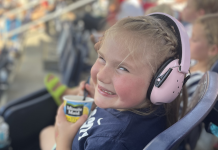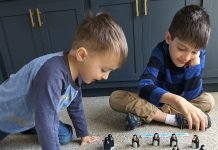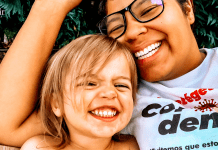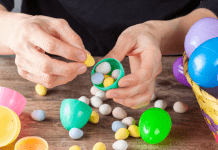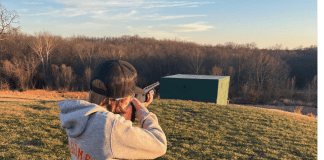Last week was a DOOZY, even for coronavirus standards. A root canal, an irreparable furnace, a best friend’s miscarriage, and my 91-year-old Grandpa’s cancer diagnosis. I’m exhausted. I’m sad. AND thankfully I’m supported.
Friends and family are my outlets; sharing with them allows me to disperse my grief and gives me access to encouragement. A 6-year-old isn’t so lucky. He doesn’t get to call up his friends or text them to say, “Man, this week was horrible.”
For my son, in this season of containment, I’m that outlet.
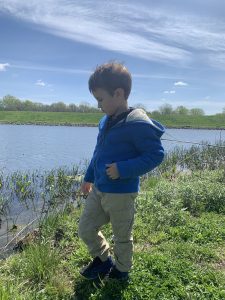
Amid all of the happenings during this pandemic, my responsibility to be his mama hasn’t changed. I have a challenging job to help him process his emotions and grief by answering his constant questions and explaining loss and death in a non-traumatizing way. Is that even possible? In a way that doesn’t damage his sensitive, still-developing brain? All while dealing with my own sadness, loss, and shall I say it again? Exhaustion.
“I heard you tell Momo this could be ‘IT’ for Great-Grandpa, right?” he asked me.
I felt terrible for burdening him with that thought. The tone of his sweet voice was edged by anxiety. He doesn’t know Grandpa too well, but he knows that the IT means imminent death. The IT struck a chord with my son’s feelings about death and sickness and the little he knows about “the virus” that has taken away literally everything he had to look forward to about the spring and summer. Soccer games were the first to go, golf lessons next, and now baseball. Not to mention swimming lessons, vacations, and sleepovers with grandparents.
“Grandpa is fine” is the only thing I’m telling him for now. It allows him to let go of worry that he doesn’t need to carry at this moment.
I’ve found a few things that work for both him and me when walking through this bleak season. I’m not a professional. I’m just a mom who found some things that are working.
Avoiding Scary Exposures I’m ensuring that serious or scary conversations about loss, death, and dying are kept age appropriate. I wasn’t sure what that was so I’ve done a lot of researching and asking a relative who is a psychologist. She recommended the Child Mind Institute. The site provides many resources to address the mental health of children at all ages. Here is their page specifically related to trauma and grief.
There is no more “listening-in” on adult conversations or the news. Intense information is not discussed by my husband and me while our kids are awake. Their brains and heart don’t need extra stress while they are in this critical development stage.
Focusing on Safety That reference to Grandpa was not the first time since this pandemic started that my son brought up death. It started, ironically, with Disney characters “dying.” “Why does he turn gray when he dies? Why does he have to die?” In another movie recently released, a desperate son tries to bring his Dad back from the dead. “Why did he get sick?” With my response, I keep it REALLY simple.
-
- Acknowledge the question with feelings, “When people die we feel sad. We don’t always know why they pass away.”
- Reassure him he’s safe, “You are safe with Mommy and Daddy at home.”
- Hug it out. (This one is good for both of us!)
“We stay home, that keeps us safe, and keeps us from getting sick and spreading germs to others.” I realize, when it comes to something he’s personally lost, that may be not enough to help with the sadness and grief.
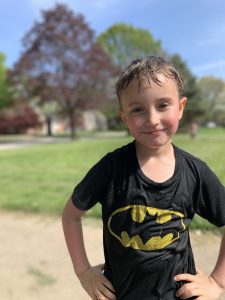
Creating Joy Right Now His questions haven’t stopped with death. The loss of fun he is seeing in his own life is on repeat. Why has his whole soccer season been cancelled? Again, I’m keeping it simple because it is what I have the capacity to handle right now. When he asks for something that is feasible (even if it’s super messy) I try to say, “YES!”
You want to dig a hole in our lush green grass and fill it with water? Yes. You want to run through the sprinkler in fresh grass clippings? Yes. You want to have a picnic? Yes. You want to throw sticks in the lake? Yes. You want to watch ANOTHER movie? With popcorn? Yes and yes. Allowing him to make his own fun and feel joy has been so healing and refreshing. He’s also gaining independence and creativity by coming up with new ideas for how to make life messy…I mean fun.
Planning for the Future He needs hope, a reminder that this won’t last forever. “What do you want to do when ‘the virus’ is over?” He couldn’t name a single thing. Cue the tears. I tried to get him talking, “I’m going to Target and Starbucks.” His eyes got big and he started dreaming up a perfect day. His day involved a very long trip on an airplane. Dream big, buddy, because even though we don’t know when this social distancing, proceed with caution chapter will be done or when life will return to normal, we do know that we all need something to look forward to.
As mentioned earlier, the Child Mind Institute has an abundance of resources and information. The institute also offers telehealth sessions for education and support regarding children’s mental health. As for our family, keeping it developmentally appropriate and building hope for when this pandemic is contained is where I’m at right now.



